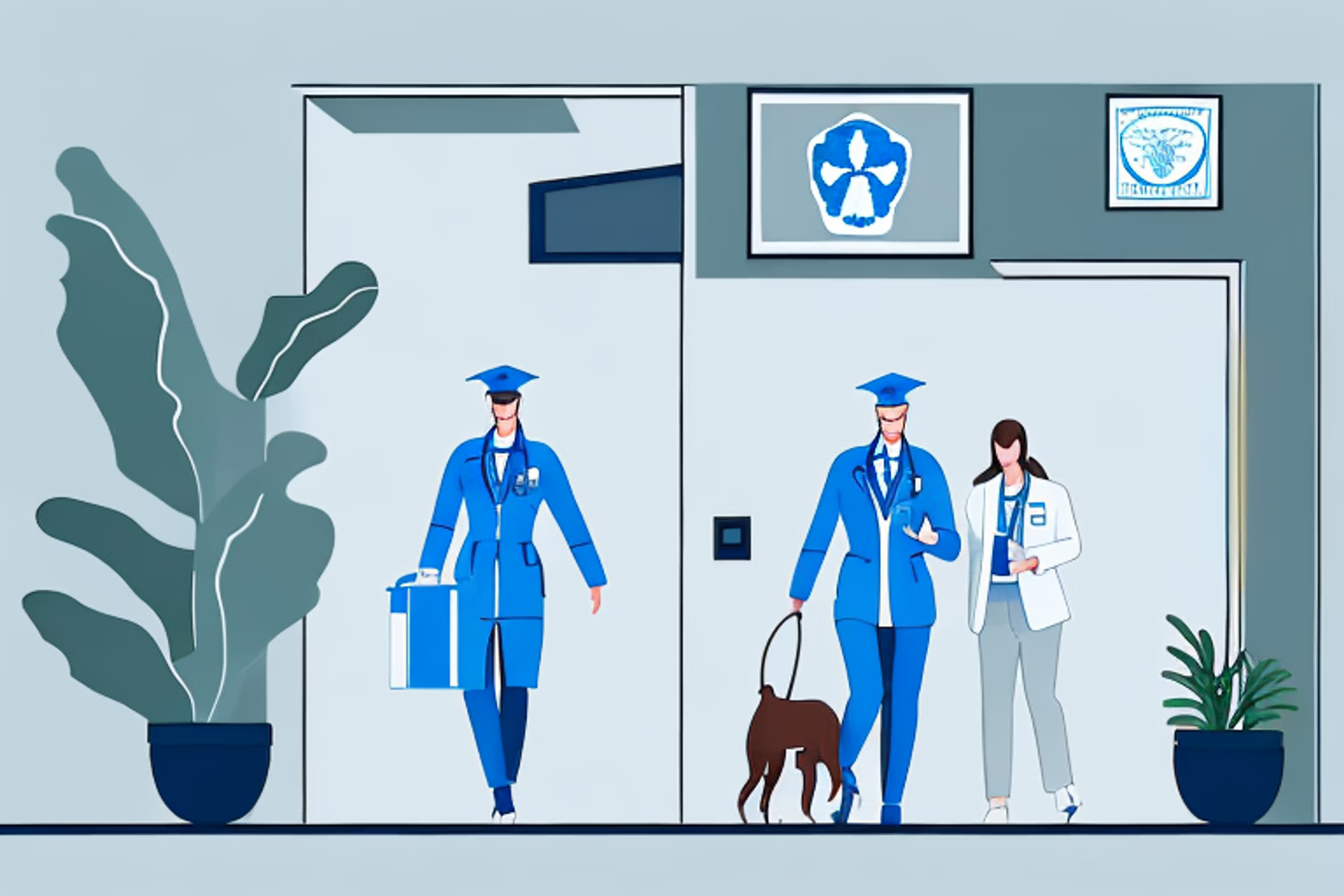Exploring Veterinary School: Requirements and Application Process
If you're considering a career in veterinary medicine, it's important to understand the requirements and application process for veterinary school.
Posted April 10, 2025

Table of Contents
If you have a passion for helping animals and a desire to pursue a career that combines science, medicine, and compassion, then veterinary school may be the perfect path for you. However, before embarking on this journey, it is important to understand the requirements and application process for veterinary school.
What is Veterinary School?
Veterinary school is a graduate-level program that prepares students to become veterinarians, providing them with the knowledge and skills to diagnose and treat animal diseases and injuries. During their education, students will gain extensive clinical experience working with a wide range of animals, from cats and dogs to livestock and exotic species.
Additionally, veterinary school also teaches students about animal behavior, nutrition, and welfare. This knowledge is important for veterinarians to provide comprehensive care for their patients and to educate pet owners on how to properly care for their animals. In addition to clinical experience, veterinary students also participate in classroom lectures, laboratory work, and research projects to further their understanding of animal health and medicine.
Why Consider Veterinary School?
There are many reasons why someone may consider veterinary school. For animal lovers, the opportunity to help improve the health and well-being of animals can be incredibly rewarding. Additionally, the field of veterinary medicine offers a wide range of career paths, from private practice to research and public health.
Furthermore, the demand for veterinarians is expected to grow in the coming years, with the Bureau of Labor Statistics projecting a 16% increase in employment from 2019 to 2029. This means that graduates of veterinary school can expect to have a variety of job opportunities available to them, with competitive salaries and benefits.
Steps to Becoming a Veterinarian
To become a veterinarian, there are several steps you must complete:
Once you have obtained your license, you can choose to specialize in a particular area of veterinary medicine. There are many different specialties to choose from, including surgery, dermatology, and oncology. Specializing can require additional education and training beyond veterinary school.
It's important to note that becoming a veterinarian requires a significant amount of time, dedication, and hard work. It's not uncommon for aspiring veterinarians to spend 8 or more years in school and training before they can practice on their own. However, for those who are passionate about animals and committed to providing them with the best possible care, the rewards of a career in veterinary medicine can be immeasurable.
Pre-Veterinary Requirements
Before applying to veterinary school, it is important to ensure that you have met all of the pre-veterinary requirements. These typically include:
- Biology courses with lab (8 semester hours)
- General Chemistry courses with lab (8 semester hours)
- Organic Chemistry courses with lab (8 semester hours)
- Biochemistry (3 semester hours)
- Physics courses with lab (8 semester hours)
- Mathematics courses, including calculus (6 semester hours)
It is important to note that these pre-veterinary requirements may vary slightly between different veterinary schools. It is recommended that you research the specific requirements for the schools you are interested in applying to.
In addition to these academic requirements, many veterinary schools also require applicants to have experience working with animals. This can include volunteering at animal shelters, working at a veterinary clinic, or shadowing a veterinarian. It is important to gain this experience early on in your academic career, as it can be a competitive aspect of the application process.
Bachelor's Degree Options for Aspiring Veterinarians
While there is no specific Bachelor's degree required to attend veterinary school, most students pursue a science-related degree such as biology, animal science, or pre-veterinary medicine. To increase the chances of acceptance to veterinary school, it is important to maintain a high GPA and gain relevant experience working with animals.
Additionally, some veterinary schools may require specific prerequisite courses, such as genetics, microbiology, and anatomy. It is important to research the requirements of the veterinary schools you are interested in and plan your undergraduate coursework accordingly. Some universities also offer combined Bachelor's and Doctor of Veterinary Medicine (DVM) programs, which can shorten the time and cost of obtaining both degrees.
The Importance of Hands-on Animal Experience
One of the most important factors in the veterinary school application process is hands-on animal experience. This may include shadowing a veterinarian, working at an animal shelter, or volunteering at a wildlife rehabilitation center. Having experience working with a variety of animals can demonstrate to admissions committees that you have a genuine passion for the field.
Furthermore, hands-on animal experience can also provide valuable learning opportunities that cannot be gained through textbooks or lectures. By working with animals, you can develop important skills such as animal handling, restraint, and medication administration. These skills are essential for a successful career in veterinary medicine and can also help you stand out in the competitive application process.
The Veterinary College Admission Test (VCAT)
The Veterinary College Admission Test (VCAT) is a standardized exam that assesses your knowledge in the areas of biology, chemistry, physics, and reading comprehension. This exam is typically taken during the spring or summer of your junior year of college, and your scores will be included in your veterinary school application.
Application Process for Veterinary School
The application process for veterinary school typically involves the following steps:
Tips for Writing a Strong Personal Statement
When writing your personal statement, it is important to showcase your passion for veterinary medicine and your unique qualifications. Some tips for writing a strong personal statement include:
- Be specific about your experiences and accomplishments
- Showcase your knowledge of the veterinary profession
- Explain why you are passionate about veterinary medicine
- Proofread carefully for grammar and spelling errors
Letters of Recommendation: Who to Ask and What to Expect
When selecting who to ask for letters of recommendation, it is important to choose individuals who can speak to your qualifications and experience. This may include veterinarians you have worked with, professors in science-related fields, or employers. When asking for a letter of recommendation, be sure to provide the individual with details about your experience and qualifications, and give them plenty of time to write the letter.
Common Interview Questions for Veterinary School Applicants
If you are invited to participate in an interview as part of the veterinary school application process, you may be asked a wide range of questions. Some common interview questions for veterinary school applicants include:
- Why do you want to become a veterinarian?
- What experiences have you had working with animals?
- How do you handle stress?
- What do you think is the biggest issue facing the veterinary profession?
How to Choose the Right Veterinary School
When choosing a veterinary school, there are several factors to consider, including:
- Location
- Cost
- Curriculum and clinical experience
- Opportunities for research and specialization
Understanding the Costs of Veterinary School
The cost of attending veterinary school can vary widely, with some programs costing upwards of $200,000. It is important to consider the overall cost of attendance, including tuition, fees, books, and living expenses, when choosing a school.
Financial Aid and Scholarships for Veterinary Students
Fortunately, there are many opportunities for financial aid and scholarships for veterinary students. Some options include:
- Grants and scholarships offered by individual veterinary schools
- Federal student loans
- Loan repayment programs for veterinarians who work in underserved areas
What to Expect in Veterinary School: Curriculum and Clinical Experience
During veterinary school, students will receive both classroom and clinical training, gaining knowledge in areas such as anatomy, physiology, pharmacology, and surgery. Clinical experience is a major component of veterinary education, allowing students to work with a wide variety of animals under the supervision of experienced veterinarians.
Opportunities After Graduating from Veterinary School
After graduating from veterinary school and obtaining a license to practice, there are many career paths available to veterinarians. Some options include:
- Private practice
- Research
- Public health
- Zoo medicine
- Wildlife rehabilitation
The Job Outlook for Veterinarians
The job outlook for veterinarians is strong, with the Bureau of Labor Statistics projecting a 16% increase in employment from 2019-2029. As the demand for veterinary services continues to grow, there will be ample opportunities for new graduates to enter the field.
If you are considering veterinary school, it is important to understand the requirements and application process in order to make an informed decision. By following these steps and preparing thoroughly, you can increase your chances of being accepted to a veterinary program and embarking on a rewarding career serving animals and their owners.












